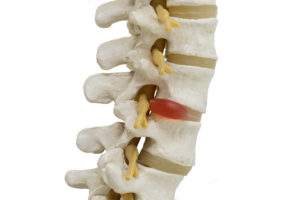 Many people think of herniated discs as an uncomfortable but common part of aging. While being over 35 is a common risk factor for herniated discs, you can also be at risk if you are overweight or have poor posture, or even if you participate in professional sports. It can be easy to ignore the problem at first, but over time it may worsen without the care of a Tucker orthopedics specialist. When not addressed properly, a herniated disc may negatively impact your daily life and prevent you from carrying out your normal activities.
Many people think of herniated discs as an uncomfortable but common part of aging. While being over 35 is a common risk factor for herniated discs, you can also be at risk if you are overweight or have poor posture, or even if you participate in professional sports. It can be easy to ignore the problem at first, but over time it may worsen without the care of a Tucker orthopedics specialist. When not addressed properly, a herniated disc may negatively impact your daily life and prevent you from carrying out your normal activities.
Causes of Herniated Discs
A herniated disc, also known as a slipped disc, has not actually “slipped” but has moved, split, bulged, or ruptured. These discs are cartilage that forms between the bones in your spinal column, or vertebrae, that serve to protect the area and absorb shock. When these discs move out of place, they can allow nerves to exit the spine and move into the nearby tissue. The jelly-like substance inside the discs can also escape and place pressure on the spinal cord and surrounding nerves.
There are a number of ways a disc can become herniated. This issue can often occur as a result of degeneration over time, associating it with old age, and years of neglect often contribute to the severity. Certain actions can also lead to a slipped disc, like lifting heavy objects that strain the back causing back pain or worse, back injuries, or repetitive performance of an athletic endeavor. While anyone can suffer from a disc injury, people with weak muscles and sedentary lifestyles may be more prone.
Early Signs of Disc Injuries
Herniated discs can occur in a number of ways, impacting different parts of your body. When the issue occurs in your neck, this is called a herniated cervical disc and will most likely impact your arms. A thoracic herniated disc occurs in the upper back, while lumbar herniated discs will be in the lower back. Any herniation in the back can cause symptoms to be felt in the legs.
Whether in your legs or arms, the initial symptoms are often a tingling or numb feeling in the associated extremities. It is also common to feel neck pain or pain in the spine when you bend, twist, or move in certain ways. Your fine motor skills may be reduced as well, due to weakness or loss of muscle control. Depending on the location and severity, your symptoms may vary, so it is important to seek treatment as soon as you suspect a disc injury.
Advanced Complications
Without proper treatment from a Tucker orthopedics provider, serious and permanent nerve damage is a potential outcome of extreme cases of herniated discs. When a disc is severely herniated enough, it can begin to impede movement and range of motion in your arms and legs. When this happens, fine motor skills may suffer, and your ability to walk may even be impacted. Herniated discs in the lumbar can cause nerve problems that specifically cause you to lose control of your bladder and bowel movements.
Ignoring initial symptoms can cause these more serious complications and impact your ability to move. Issues from a herniated disc can also cause you to unknowingly change your posture, placing pressure on other joints and leading to long-term damage. The wear and tear on your body then escalates more quickly and can be hard to reverse.
How Long Can I Wait to Seek Treatment?
It can be a matter of weeks before a herniated disc leads to more serious complications, and this can be shorter if you work in manual labor or are exacerbating the issue. Waiting beyond a month for treatment can lengthen the time that will be needed for recovery, and as you extend that time, it becomes more likely you will have long-term issues.
As soon as you identify numbness and tingling in your arms or legs, you should seek care from a Tucker orthopedics and chiropractic specialist. Once the location of the herniated disc is found, you will be able to determine short and long term treatment plans for your pain.
At AICA Tucker, our chiropractors work closely with orthopedists, pain relief specialists, and physical therapists to determine an individualized treatment plan. You will be given a plan for exercises and stretches to help you gain strength back while still allowing your discs to heal. Though this may be a long path to recovery, it will be worth it as you work with the specialists at AICA Tucker to relieve your pain and regain your life. Call us today!
